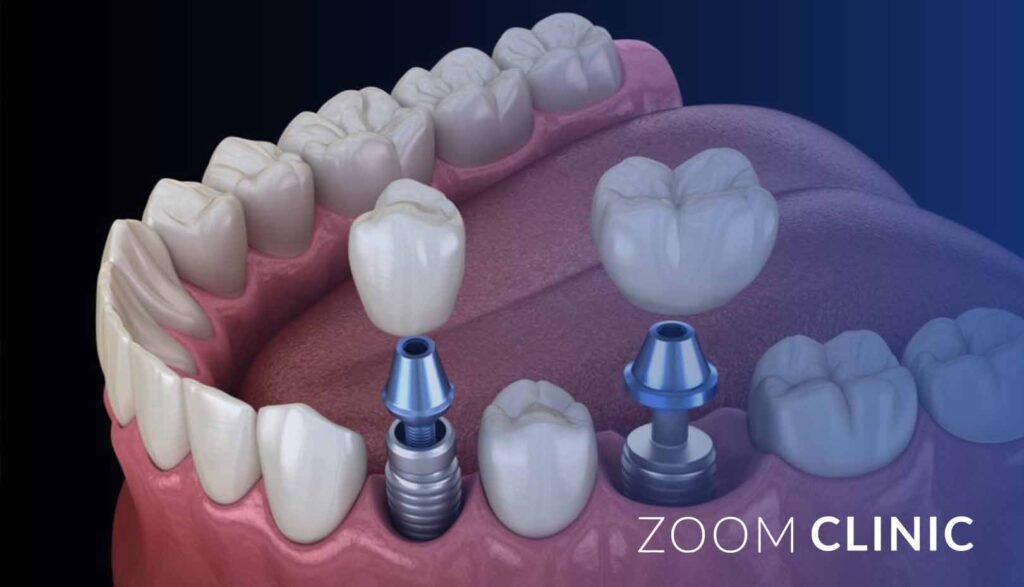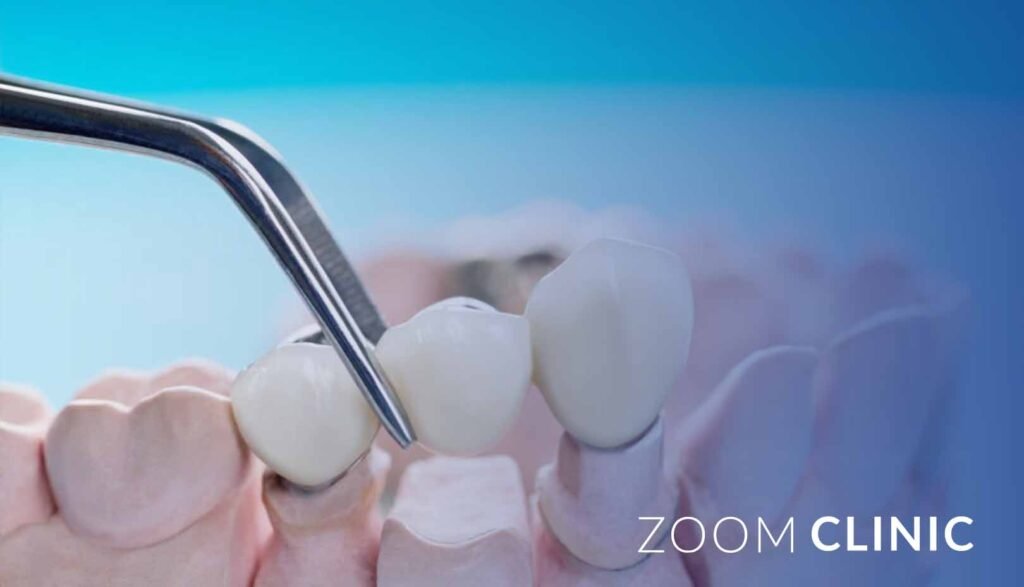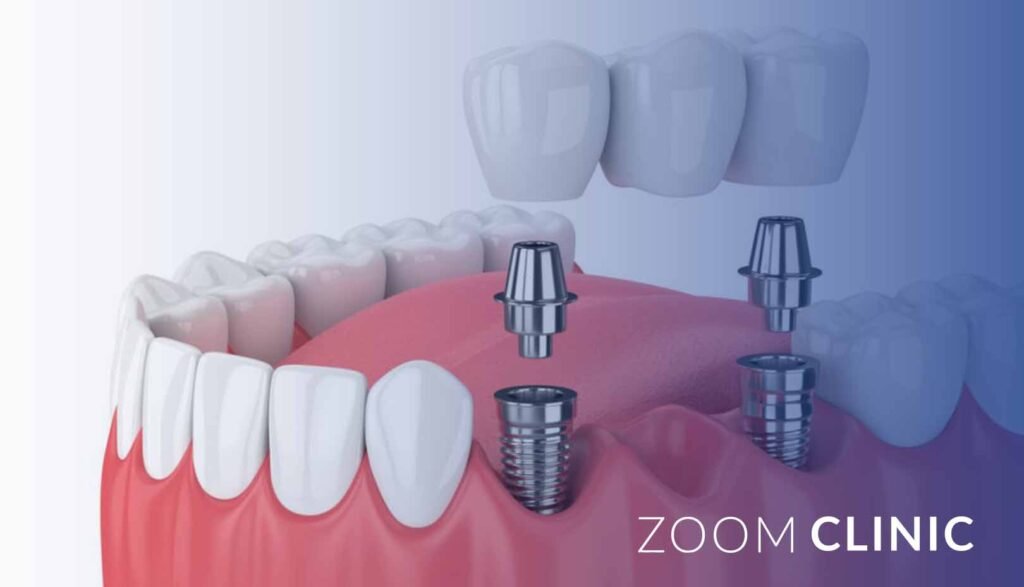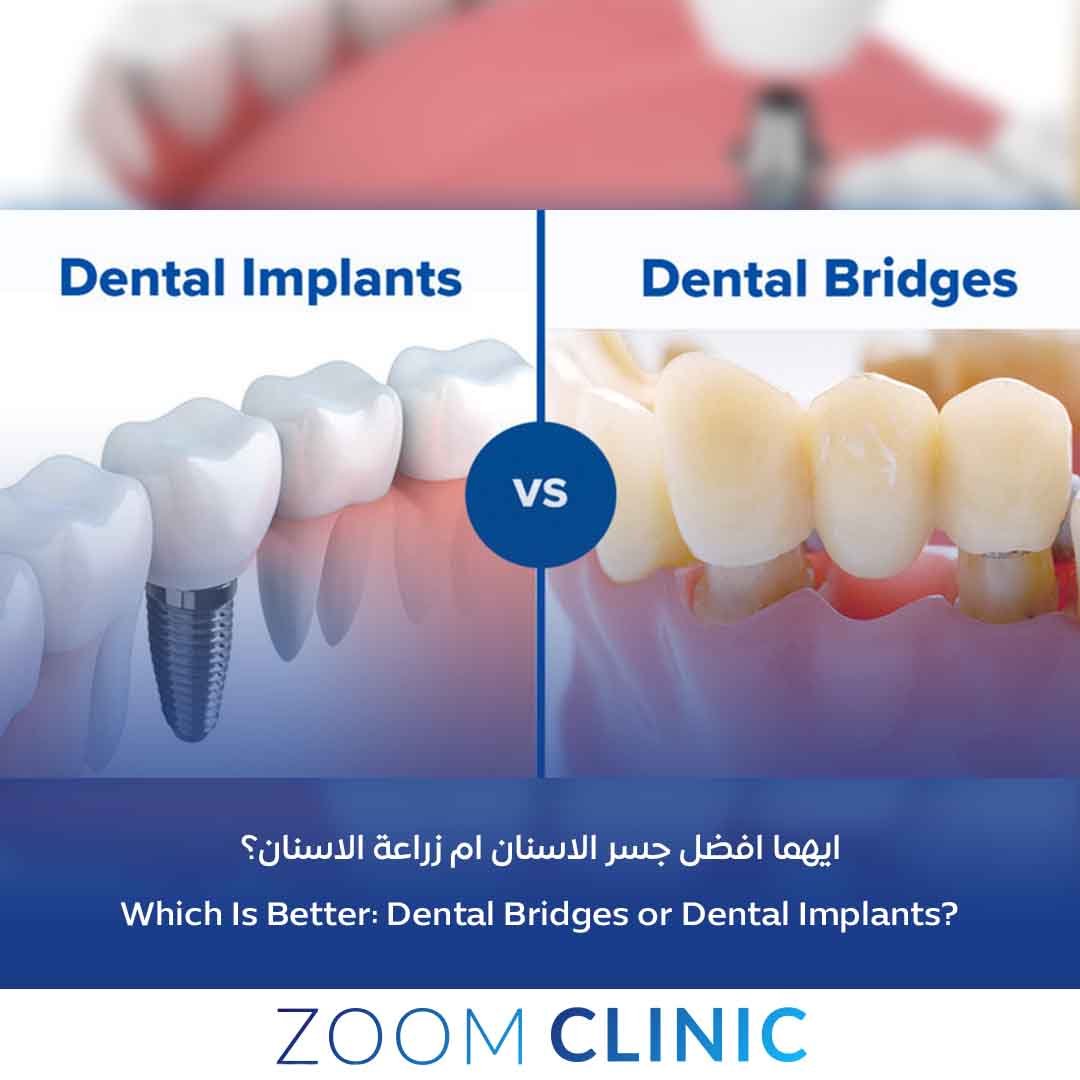Regarding replacing missing teeth, two popular options often arise dental bridges and dental implants.
Both solutions are effective, but deciding which is better depends on several factors, including your oral health, budget, and personal preferences.
This comprehensive guide delves into the key differences, advantages, and potential drawbacks of dental bridges and implants to help you make an informed decision.
Understanding Dental Bridges
What Is a Dental Bridge?
A dental bridge is a fixed dental restoration that replaces one or more missing teeth. It consists of artificial teeth (called pontics) anchored to the adjacent natural teeth or dental crowns.
Types of Dental Bridges
- Traditional Bridge: Anchored to crowns on adjacent teeth.
- Cantilever Bridge: Supported by a crown on one adjacent tooth.
- Maryland Bridge: Uses a metal or porcelain framework bonded to the back of adjacent teeth.
How Are Dental Bridges Installed?
- Preparation of the adjacent teeth to support the bridge.
- Impressions are taken to create a custom-fit bridge.
- Temporary bridges are placed while permanent ones are fabricated.
- The permanent bridge is cemented into place.
Understanding Dental Implants

What Is a Dental Implant?
A dental implant is a titanium post surgically placed into the jawbone to replace the root of a missing tooth. Once the implant integrates with the jawbone, an artificial tooth (crown) is attached to the post.
Types of Dental Implants
- Single-Tooth Implant: Replaces one missing tooth.
- Multiple Implants: Used for replacing several teeth or supporting dentures.
- All-on-4 Implants: A total arch replacement supported by four implants.
How Are Dental Implants Installed?
- Initial Consultation: Includes X-rays and a treatment plan.
- Implant Placement Surgery: The implant is inserted into the jawbone.
- Healing Period: Osseointegration occurs, where the implant fuses with the bone.
- Abutment Placement: A connector is attached to the implant.
- Crown Attachment: A custom-made crown is secured to the abutment.
Key Differences Between Dental Bridges and Dental Implants
| Feature | Dental Bridge | Dental Implant |
| Longevity | 5–15 years | 20+ years with proper care |
| Cost | Lower initial cost | Higher initial cost |
| Procedure Time | Short (1–2 weeks) | Longer (3–6 months) |
| Bone Health | Does not prevent bone loss | Prevents bone loss |
| Adjacent Teeth | Requires grinding of healthy adjacent teeth | Does not affect adjacent teeth |
| Maintenance | Requires special flossing tools | Easier to maintain like natural teeth |
| Comfort and Function | May feel slightly less natural | Feels like natural teeth |
Pros and Cons of Dental Bridges

Pros
- Shorter Procedure: Dental bridges can be completed in just a few visits.
- Lower Initial Cost: They are often more affordable than dental implants.
- Non-Surgical: Suitable for patients who cannot undergo surgery.
Cons
- Impacts Adjacent Teeth: Requires filing down healthy teeth for support.
- Does Not Prevent Bone Loss: The jawbone in the missing tooth area may deteriorate over time.
- Shorter Lifespan: May need replacement every 5–15 years.
Pros and Cons of Dental Implants
Pros
- Longevity: Dental implants can last a lifetime with proper care.
- Bone Preservation: Stimulates the jawbone, preventing bone loss.
- Natural Appearance and Function: Feels and functions like a natural tooth.
Cons
- Higher Initial Cost: The upfront expense is more significant than a dental bridge.
- Longer Procedure Time: Requires several months for completion.
- Surgical Risks: Involves a surgical procedure, which may not be suitable for all patients.
Cost Comparison of Dental Bridges and Dental Implants
Dental Bridges Cost
The cost of a dental bridge varies based on the materials used (porcelain, metal, or zirconia) and the number of teeth being replaced. On average:
- Traditional bridges: $500–$1,200 per tooth.
- Maryland bridges: $250–$600 per tooth.
Dental Implants Cost
The cost of dental implants is higher due to the surgical procedure and materials used. The price includes:
- Implant post: $1,000–$3,000 each.
- Abutment and crown: $500–$3,000.
- Additional costs: Bone grafting, if needed, adds $500–$2,500.
Long-Term Value
While dental implants have a higher upfront cost, their durability and ability to preserve bone health often make them a more cost-effective solution in the long run.
Factors to Consider When Choosing Between a Dental Bridge and Dental Implant

- Oral Health: Implants require a strong jawbone and healthy gums, while bridges do not.
- Budget: Bridges are more affordable upfront, but implants offer better long-term value.
- Aesthetics: Implants provide a more natural appearance.
- Maintenance: Bridges require more upkeep than implants.
- Medical Conditions: Conditions like diabetes or osteoporosis may affect candidacy for implants.
- Age: Implants are more suitable for younger patients due to their longevity.
Who Is a Good Candidate for Dental Implants?
- Individuals with sufficient jawbone density.
- Non-smokers or those willing to quit smoking during the healing process.
- Patients in good general and oral health.
- Those looking for a long-term solution for missing teeth.
Who Is a Good Candidate for Dental Bridges?
- Patients with adjacent teeth strong enough to support a bridge.
- Individuals are seeking a quicker and more affordable solution.
- Those unable or unwilling to undergo surgery.
Which Is Better: a Dental Bridge or a Dental Implant?
When to Choose a Dental Bridge
- If you need a quicker, more affordable solution.
- If you have a weak jawbone structure and cannot undergo bone grafting.
- If adjacent teeth already need crowns.
When to Choose a Dental Implant
- If you are looking for a long-term, durable solution.
- If you want to prevent bone loss and maintain jaw health.
- If you want the closest alternative to natural teeth.
Conclusion
Both dental bridges and dental implants are excellent solutions for replacing missing teeth, but the right choice depends on your unique needs and circumstances.
Dental implants offer superior longevity, aesthetics, and bone health benefits, making them an excellent long-term investment.
Conversely, dental bridges provide a quicker and more affordable option for patients who may not be candidates for implants.
To determine the best solution, consult with a qualified dentist who can evaluate your oral health, lifestyle, and budget to help you make the most informed decision. Remember, investing in your smile is always worth it!
Get the special offer today from Zoom Clinic
Related Articles:
How Many Days dental implantation takes in Türkiye
Frequently Asked Questions (FAQs)
How long do dental bridges and implants last?
Dental bridges typically last 5–15 years, depending on care and material quality. Dental implants, however, can last a lifetime with proper maintenance.
Can dental bridges or implants replace multiple teeth?
Yes, both options can replace multiple teeth. Dental bridges can span several missing teeth, while multiple implants or implant-supported bridges can replace larger gaps.
Are dental implants painful?
Dental implant surgery involves some discomfort, but it is generally well-managed with local anesthesia and post-operative care.
Can smokers get dental implants?
Smoking can affect implant success rates by impairing healing. Smokers are encouraged to quit before undergoing implant surgery.
What’s the recovery time for dental implants?
Healing and osseointegration take 3–6 months. However, patients can often resume normal activities within a few days after surgery.


